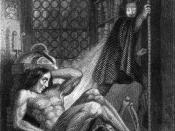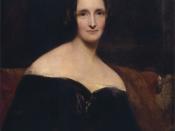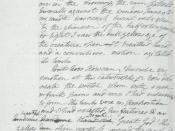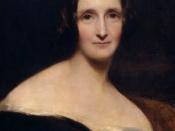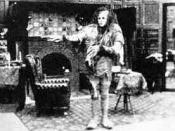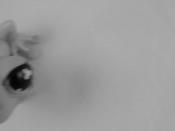Since its publication in 1818, Mary ShelleyÃÂs Frankenstein has provoked much debate. The most common difference of opinion surrounds ShelleyÃÂs intention as to the true identity of the èmonster. According to WebsterÃÂs dictionary, a monster is defined as èAny animal or human grotesquely deviating from the normal shape, behavior, or character. Most readers assume that the real èmonster is ShelleyÃÂs Creature. But another, perhaps deeper and more thoughtful analysis, uncovers contextual clues given by Shelley that proves the true monster was Victor Frankenstein--the creator, not the Creature. Although the Creature outwardly appears to be the monster, it is VictorÃÂs actions and wild emotions that show he too is a candidate for that designation.
Shelley portrays Victor FrankensteinÃÂs childhood in relatively normal terms. He is depicted as having spent his youth surrounded by a close domestic circle, consisting of his friends, Elizabeth Lavenza and Henry Clerval, as well as his parents.
However, this picture-perfect childhood begins to fade as Victor becomes interested in the natural sciences, and his monstrous inner-side begins to emerge. He soon dedicates his entire life to studying èforbidden knowledge, of matters of life, death, animation, and the inanimate. Ultimately, he resolves to create his own being from dead tissues and organs. The religious issues this raises are profound, but he presses on without wasting time pondering the realm he is entering. Thus his desire to delve into these èblack arts puts him on the path to monster hood. This project utilizes all of his time, and he shuts out all else. Victor forces himself into a life of solitude. èI determined to visit some remote spot of Scotland and finish my work in solitude (152). VictorÃÂs self-imposed alienation becomes the second step in his descent and transformation into èotherness from the rest of mankind. Being apart from humans begins the process of Victor turning himself into a monster. Already, VictorÃÂs actions show that he is becoming the true èmonster, saying èAn insurmountable barrier has been placed between me and my fellow men (147). Behind this èbarrier, insanity befalls Victor. His new mental state is reflected in his dreams, such as when Elizabeth turns into his mother. Oedipus, another monster, is here referenced by Shelley. Wikipedia tells the story as follows: èLaius, Oedipus' father, kidnapped and raped the young boy Chrysippus and was then cursed by Chrysippus' father, Pelops. The weight of this curse bore down onto Oedipus himself. At his birth, it was prophesied that he would kill his father and marry his mother. Also, he begins to have thoughts of suicide, èOften I say, I was tempted to plunge into the silent lake, that the waters might close over me and my calamities forever (78). It is in solitude that Victor begins to lose his mind, and becomes obsessed with his own twisted vision.
Egocentricity, which morphs into megalomania, is the next basis for VictorÃÂs portrayal by Shelley as the real èmonster. He has caring family, friends, and even his future wife, Elizabeth, all of whom he neglects so he can work, single-mindedly on his horrible goal. Indeed, as soon as he successfully creates his èchild, he just as quickly abandons it. Victor the creator and parent, is disgusted with the Creature and immediately abandons him, without even considering how the Creature might perceive this rejection. VictorÃÂs cruel treatment of the Creature is in strong contrast to the selflessness of his own parents and Clerval. If Victor had only guided and nurtured his creation, then the Creature would never have wanted revenge on Victor and his family. Victor, always in isolation and an egomaniac, selfishly refuses to share his scientific breakthrough with anyone else; èThe summit of my desires was the most gratifying consummation of my toils [] this discovery was so great and overwhelming [] the study and desire of the wisest men since the creation of the world was now within my grasp. (38)Victor has determined that he has grasped what the èwisest men before him could not-- a prize only he had won. He is obviously consumed by self-glory and excessive pride. He also, without any evidence to prove his contention, has somehow determined that his goal to create life from the inanimate has always been shared by the èwisest men. It is logic circular: if he has determined his goal is worthy, then it must be a goal shared by the èwisest men, which he has now èbested. Victor believes he is above everyone and on an equal plain with the true Creator himself, God. However, when one tries to imitate GodÃÂs powers, they suffer. Here Shelley references to Icarus, from Greek mythology, who suffered the same fate as Victor. Wikipedia states: èIcarus continues to be cited as a moral lesson about the danger of hubris, suggesting that someone who dares to fly too close to the realm of the gods will suffer for it. Icarus may be regarded as a metaphor for a social fall [] Icarus created wings from feathers and wax, and when he flew to close the sun (a symbol of the gods), his wings melted and he fell to his death. Victor makes the same mistake when he creates life from the inanimate; he tries to imitate God, and just like Icarus, he crashes and burns.
Since it would hurt his self-image, Victor never accepts the blame for his creationÃÂs actions. In fact, at first he does not even confess to creating the Creature. William, Henry, and Elizabeth were all killed by VictorÃÂs èchild, and yet still, he does not want to admit his fault in any of this. But FrankensteinÃÂs relation to his creation is the same as a parent to his child; the creator/parent is responsible for his childÃÂs actions. Victor knew that his creature was the one that killed William and Henry, but he did not say anything; èIt instantly darted into my mind that the murderer had come to mock at my misery [] as a new incitement for me to comply with his hellish desires (170). Wanting to distance himself from his childÃÂs wrongdoings, Victor does not pursue his lost creature, and instead goes about life at the university. VictorÃÂs refusal to accept responsibility, only leads to more and more suffering by others. Unless directly confronted by his mistakes, Victor refuses to acknowledge that he has made them at all. He eventually ends up reflecting on his deathbed on WaltonÃÂs ship as follows: èDuring these last days I have been occupied in examining my past conduct; nor do I find it blamable (207). Even then, he will not acknowledge or take responsibility for his monstrous actions.
Sources outside of the text provide evidence as well, showing ShelleyÃÂs candidate for the real èmonster. According to an essay written by Anne Mellor, abandonment was a sensitive subject for Shelley, seeing how she was a èMotherless child with a distant father in a world with few role models for a literate young woman, Shelley would have empathized deeply with the Monster left to fend for himself (Mellor 1). Therefore, she would have empathized with the Creature, whom Victor èbrought to life and then rejected. This evidence further amplifies the argument that Shelley intended for Victor to be the real èmonster, since she was able to relate to the CreatureÃÂs abandonment by a parent who should have provided love and nurture; Shelley thus puts the blame for all that occurs directly on Victor. Shelley asks: èCan we expect to live humanly when raised in a harsh and unloving environment?It becomes evident that Victor Frankenstein is the true ècreature. It is not only for that he chooses to isolate himself, but rather because he is an egomaniac who places himself above all mankind and on the plain of the Creator himself. Unlike our Creator however, he is selfish, he abandons his creation, and refuses to accept the blame for his creationÃÂs misconduct. VictorÃÂs action and megalomania make him the monster. VictorÃÂs desertion of the Creature caused him to do the terrible things he did, making Victor the greater of the two evils. All of this textual evidence from Frankenstein, proves that the Creature, contrary to a surface reading, was not the real èmonster, but it was actually the creator himselfDr. Victor Frankenstein. Victor has been destroyed to the core and has only one purpose left in living, to set precedence for generations of what not to do; èBut I am a blasted tree; the bolt has entered my soul; and I felt then that I should survive to exhibit what I shall soon cease to be- a miserable spectacle of wrecked humanity. (149)Works Citedhttp://www.watershedonline.ca/literature/frankenstein/readingsonfrankenstein.htmlReadings on Frankensteinpublished by Greenhaven PressèAbandonment and Lack of Proper Nurture Shape the MonsterÃÂs Natureby Anne K. MellorBlackwood's Edinburgh Magazine Review of Frankenstein, 1818http://www.rc.umd.edu/reference/chronologies/mschronology/reviews/bemrev.htmlDefining Romanticism: The Implications of Nature Personified as Female in Mary Shelley's Frankenstein and Charlotte Bronte's Jane Eyrehttp://prometheus.cc.emory.edu/panels/2D/A.Renfroe.htmlThe Literary Panorama review of Frankenstein, 1 June 1818http://www.rc.umd.edu/reference/chronologies/mschronology/reviews/lprev.htmlhttp://en.wikipedia.org/wiki/Oedipushttp://en.wikipedia.org/wiki/Icarus_(mythology)
